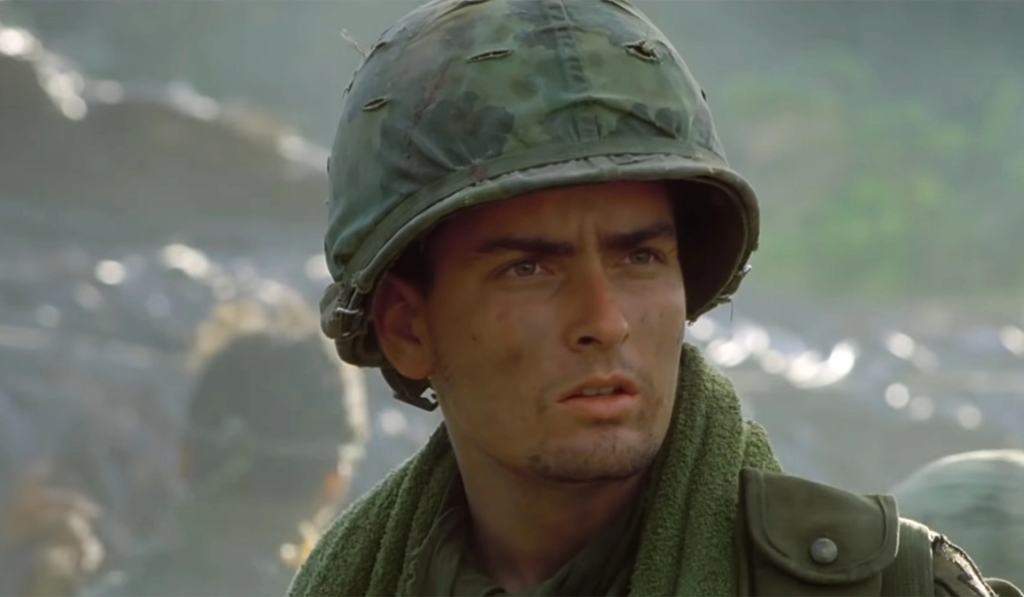
Oliver Stone is not known for timidity of vision, and in Platoon, the often-controversial filmmaker doesn’t hold back. Having been a 21-year-old infantryman during the Vietnam War, Stone synthesized that life-changing experience into his 1986 masterpiece that would go on to earn Academy Awards for Best Picture and Best Director.
Platoon, in my estimation, is easily cinema’s greatest fictional work to center on the Vietnam War (for those keeping score at home, I exclude Apocalypse Now and Full Metal Jacket because those movies, grander and more surrealistic, are less Vietnam-centric and more about War with a capital “W”), but it is much more. By concentrating on the perspective of an infantryman, Stone avoids the temptation to pontificate (a rarity for the filmmaker) about the politics and social unrest surrounding that controversial war. Platoon tells a singular story, with Stone’s onscreen doppelganger being Chris Taylor (Charlie Sheen), an idealistic 19-year-old who has dropped out of college to enlist for action in Vietnam.
Taking place in September of 1967, Platoon follows Chris’ stint with the 25th Infantry Division as Bravo Company trudges through the jungles of Vietnam. With its episodic structure, the picture expertly captures the sights, sounds and textures of war, specifically that war — the suffocating heat, the ever-present fear, the jungle diseases, the mosquitoes, the ants, the snakes, the bursts of “friendly fire” and, most pervasively, the absence of morale.

Chris provides the Everyman viewpoint through which we experience what unfolds, but the movie’s heart and soul is embodied by its two potent platoon sergeants, the compassionate Elias (Willem Dafoe) and the hardened Barnes (Tom Berenger). While both characters can be seen to represent the conflicting social factions of America in the late Sixties, Dafoe and Berenger deliver knockout performances that transcend symbolism.
Stone, for his part, resists easy judgments. Elias is kind, but perhaps too naïve for his own good. Barnes is undoubtedly brutal, but he is also an unequivocal leader. Both have been inalterably shaped by their tours of duty in Southeast Asia. Chris finds himself caught in a power struggle between the two. “I can’t believe we’re fighting each other,” the young man writes to his grandmother, “when we should be fighting them.”
More than most war films, Platoon starkly conveys the fog of war. The men of Bravo Company never know at what moment they might engage the enemy, or which Vietnamese is friend or foe, or even whether the mortar fire coming at them is from their own side. Ultimately, they don’t know much of anything beyond the edict that it is better to stay alive than die.
The soldiers’ uneasiness is reflected in the filmmaking. While Stone’s battle sequences are riveting, it is often difficult to follow the progression of actions. Chaos and confusion reign amid a seemingly endless barrage of rocket-propelled grenades and aerial bombs. The fighting is not cleanly staged or edited, but that’s the point. Stone’s movie seeks an impressionistic truth that slowly reveals itself through the walls of smoke, fire and dust.

“Hell is the impossibility of reason,” Chris writes to his grandmother, a description that captures his sense of Vietnam. Nowhere is that hell more evident than the infamous scene in which the platoon enters a small village. A fellow infantryman has been brutally slain; the enraged platoon members are out for vengeance.
What follows is disturbing and provocative. It is a testament to Stone’s storytelling that he can reveal the dehumanization of war and make it appear like an understandable progression into madness. The scene is based on the March, 1968, My Lai massacre in which U.S. forces killed hundreds of Vietnamese civilians. It is impossible not to be reminded of similar, high-profile atrocities that have occurred in the wars since Vietnam. There again is part of what makes this film so resonant. By focusing on the specific – Vietnam – Stone has told a story that reaches deeper and further.

While Platoon is very much a personal work for Stone, its brilliance is from a collective work. Robert Richardson‘s cinematography is superb, awash in the dense greens and blues of the jungle. Many of the nighttime scenes are illuminated only by flares, a detail that greatly enhances the film’s feeling of utter authenticity.
The acting is top-notch. Several of the performers — John C. McGinley, Forest Whitaker, Kevin Dillon, Keith David, Johnny Depp — would go on to big careers. The movie was a career milestone for Berenger, whom Stone cast against type as the physically and psychologically scarred Sgt. Barnes. In a film with many strong performances, Berenger’s portrayal lingers on the memory long after Platoon has come to a close.
With Samuel Barber‘s mournful “Adagio for Strings” acting as a recurring musical theme, Platoon is an often-harrowing tale that comes upon its power honestly. In the process, Stone suitably memorializes the camaraderie of the grunts who served in that difficult and unpopular war, all of them — the hard-charging and the cowardly, the country hayseeds and the streetwise urbanites, those who clung onto their sanity through drugs and those who lost their souls amid the maelstrom of battle. To put it another way, Platoon remains as phenomenal as it was upon its initial release.
One response to “Platoon (1986)”
[…] director: Jonathan Damme5. The Fly, director: David Cronenberg4. Aliens, director: James Cameron3. Platoon, director: Oliver Stone2. Blue Velvet, director: David Lynch1. Hannah and Her Sisters, director: […]
LikeLike